驻操营学区初中七年级英语下册 Unit 10 Where did you go on vacation教学设计 人教新目标版
初中英语七年级下册课件《Unit 10 Where did you go on vacation》 资料

Sally B: She went to the mountains. Tom
stayed at home
went to summer camp
Where did I go on vacation?
Did you go … on vacation? Yes, I did. / No, I didn’t.
Useful sentences: Where did you go…?
How was your vacation?
Report like this:
What did you do…?
How was the weather? …
It was sunny and warm. My friend Tina went to Wenzhou on vacation . She went to the zoo. It was really interesting…
2.
Kevin
3.
Julie
Places
• 2b Listening
Did you …
Yes, I did.
Nancy go to Central Park
Kevin play volleyball
swim? Julie go to the movies?
study for exams?
No, I didn’t.
Unit 10
Where did you go on vacation ?
Section A (1a-2c)
Name:Qian Wenjing From:Aojiang No.8 Middle School Like:go shopping and go to summer camp
七年级英语下册:Unit 10 Where did you go on vacation重难点解析(
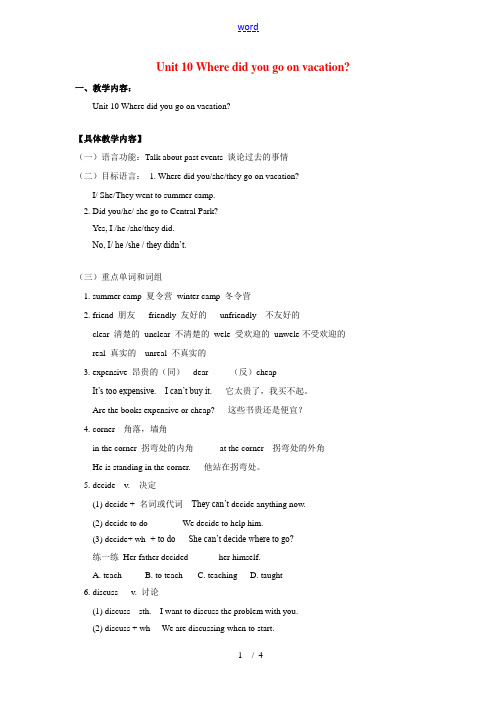
Unit 10 Where did you go on vacation?一、教学内容:Unit 10 Where did you go on vacation?【具体教学内容】(一)语言功能:Talk about past events 谈论过去的事情(二)目标语言:1. Where did you/she/they go on vacation?I/ She/They went to summer camp.2. Did you/he/ she go to Central Park?Yes, I /he /she/they did.No, I/ he /she / they didn’t.(三)重点单词和词组1. summer camp 夏令营winter camp 冬令营2. friend 朋友friendly 友好的unfriendly 不友好的clear 清楚的unclear 不清楚的wele 受欢迎的unwele不受欢迎的real 真实的unreal 不真实的3. expensive 昂贵的(同)dear (反)cheapIt’s too expensive. I can’t buy it. 它太贵了,我买不起。
Are the books expensive or cheap? 这些书贵还是便宜?4. corner 角落,墙角in the corner 拐弯处的内角at the corner 拐弯处的外角He is standing in the corner. 他站在拐弯处。
5. decide v. 决定(1) decide + 名词或代词They can’t decide anything now.(2) decide to do We decide to help him.(3) decide+ wh- + to do She can’t decide where to go?练一练Her father decided ______ her himself.A. teachB. to teachC. teachingD. taught6. discuss v. 讨论(1) discuss sth. I want to discuss the problem with you.(2) discuss + wh- We are discussing when to start.7. back adv. 回原处,往回去go back 回去 e back 回来n. 背部,后面,后部in/ at the back of…在……后面at the back of the house(反) in front of / in the front of8. the Great Wall 长城He who does not reach the Great Wall is not a true man.不到长城非好汉。
新目标七年级英语下册全册Unit 10- Where did you go on vacation-英文教案

新目标七年级英语下册全册Unit 10: Where did you go on vacation?英文教案Unit10:wheredidyougoonvacation?LanguagegoalInthisunitstudentslearntotalkaboutpastevents.Newlanguagewheredidyougoonvacation?Iwenttothemountains.wheredidtheygoonvacation?TheywenttoNewyork.wheredidhegoonvacation?Hestayedathome.wheredidshegoonvacation?Shevisitedheruncle.Didyougotothebeach?yes,Idid./No,Ididn't.SectionAAskquestionsaboutwhatstudentsdidlastSaturday.writes omepasttensestatementsontheboard.Ask,whowenttothemo vieslastSaturday?Pointtoastudentwhoraiseshisorherha nd.SarawenttothemovieslastSaturday.Repeat.writethis sentenceontheboard.Underlinethewordwent.Ask,whovisi tedafriendlastSaturday?Pointtoastudentwhoraiseshisorherhand.carlosvisitedafriendlastSaturday.Repeat.writethis"senten ceontheboard.Underlinethewordvisited.Pointtothewordswentandvisitedinthesentencesontheboa rd.Say,weusethesewordstotalkaboutthingsthathappened inthepast.Thenwritethesepairsofwordsontheboard:go-went,visit-visited.Askastudenttopointoutthewordsthattalkaboutt hepast.aThisactivityintroducesthekeyvocabulary.Focusattentiononthepicture.Askstudentstotellwhatthe ysee.Say,Eachpictureshowssomethingapersondidinthepa eachactivityandaskstudentstorepeat:wenttothe mountains,wenttoNewyorkcity,wenttosummercamp,visite dmyuncle,stayedathome,wenttothebeach,andvisitedmuse ums.Pointoutthenumberedlistofactivities.Sayeachoneagain andaskstudentstorepeat.Thenaskstudentstomatcheachphrasewithoneofthepicture s.Say,writetheletterofeachpicturenexttothenameofthe activity.Pointoutthesampleanswer.checktheanswers.bThisactivitygivesstudentspracticeinunderstandingthe targetlanguageinspokenconversation.Pointtothepicture.Askstudentstotellwhatthepersondid ineachscene.Forexample,TinawenttothemountainsorShew enttothemountains.Playtherecordingthefirsttime.Studentsonlylisten.Playtherecordingasecondtime.Thistimesay,Therearethr eeconversations.Thepeopletalkaboutwhattheydidonvaca tion.Listentotherecordingandwritenumbersofthenamesi nthewhiteboxesinthepicture.Pleasewriteonlyfivenumbe rs.Pointoutthesampleanswernexttothepictureshowingwe nttothemountains.correcttheanswers.cThisactivityprovidesguidedoralpracticeusingthetarge tlanguage.Pointouttheexampleconversation.Asktwostudentstoread thedialoguetotheclass.Say,Nowworkwithapartner.makeyourownconversationsabo utthepictures.Saythedialogueinthepicturewithastudent.Doasecondexa mple,ifyouwish.Thenhavestudentsworkinpairs.Astheytalk,movearoundth eroommonitoringtheirwork.offerlanguageorpronunciationsupportasneeded.2aThisactivitygivesstudentspracticeinunderstandingthe keyvocabularyinspokenconversation.Pointtothethreepeople'snamesandreadthenamestothecla ss.Pointtothethreevacationactivitiesandaskastudentt oreadtheactivitiestotheclass.Say,Thisisarecordingaboutthreepeople'svacations.Ple asematchthepeoplewiththeplacestheywenttoonvacation.Playtherecordingthefirsttime.Studentsonlylisten.Playtherecordingasecondtime.Thistime,askstudentstow ritethelettersofwherepeoplewentonvacationnexttothei rnames.Pointoutthesampleanswernexttoitem1.correcttheanswers.2bThisactivityprovidesmorelisteningpracticeusingtheta rgetlanguage.callattentiontothechart.Askastudenttoreadthroughthe namesandactivitieslisted.Say,Nowlistentotherecordingagain.Thistime,pleaselis tentotheconversationsandputacheckmarkinthe"yes,Idid."or"No,Ididn't."blankaftereachactivity.|Playtherecordingthefirsttime.Studentsonlylisten.Pointoutthesampleanswerunderyes,Ididinthefirstblank afterthewords"Nancy...gotocentralPark?"Say,DidNancy gotocentralPark?yes,shedid.Playtherecordingagain.Askstudentstoputcheckmariflin thecorrectblanks.2cThisactivityprovidesguidedoralpracticeusingthetarge tlanguage.Say,Getintogroupsofthree.oneofyouwillbeNancy,onewil lbekevin,andonewillbejulie.Askeachotheraboutthevaca tions.youcantalkabouttheactivitiesfromthechartin2bo raboutanyotheractivitiesyoulike.Asstudentstalk,movearoundtheroom,monitoringtheconversationsandofferingsupportasneeded.youmaywanttohaveagroupofstudentspresenttheirconvers ationtotheclass.3aThisactivityprovidesreadingandwritingpracticeusingt hetargetlanguage.Pointoutthepicturesinthephotoalbum.Askstudentstodes cribewhattheysee.Afterthat,readthefirsttwolinesofthedialoguetothecla ss.Pointouttheanswerwasinthefirstline.Thenpointouttheblanksintherestofthelinesofthedialog ue.Readtheconversationtotheclasssayingthewordblankf oreachblankline:Howblankthebeaches?Thensay,writethewordwasorwereineachblank.Askstudent stocompletetheactivityontheirown.correcttheanswers.3bThisactivityprovidesguidedoralpracticeusingthetarge tlanguage.Pointtoeachofthepicturesandaskstudentstosaywhatthey see.Thenreadthewordsundereachpicture.Pronounceanyne wwordsandexplainwhattheymean,ifnecessary.Forexample ,Inthispictureagirlisonabus.Thegirlistakingabustrip .Ask,whatdoesrelaxingmean?Doesitmeanyouareexcitedor quiet?Howdoyoulookwhenyourelax?Ifstudentsdon'tknowt hemeaningofrelaxing,demonstratebyleaningbackinyours eatandhalf-closingyoureyes.Say,Nowworkwithapartner.makeyourownconversationsabo utthepictures.Sayadialoguewithastudent.Pointtothefoodpicture.Ask, Howwasthefood?Thestudentreplies,Itwasawful.Doasecon dexample,ifyouwish.Thenhavestudentsworkinpairs.Astheytalk,movearoundtheroommonitoringtheirwork.offerlanguageorpronunciati onsupportasneeded.4.Thisactivityprovidesspeakingpracticeusingthetarget language.Explaintothestudentsthattheyaregoingtomakeavacation photoalbumandtalkaboutitwiththeirclassmates.youmayw anttoprovidestudentswithmagazineswhichtheycancutupf ortheirphotoalbums,oraskthemtodrawthephotosorhaveth emmaketheirphotoalbumsathomeforhomework.oncestudentshavecompletedtheirphotoalbums,drawstude nts'attentiontothevacationpicturesinthestudentbook. i ngthesimplepasttense,pointtoeachpictureanddescribea fewthingsaboutyourtimeineachplace.writewh-questions ontheboard.Remindstudentsthatthephotosinthebookinac tivity4arephotosfromyourvacation.Encouragetheclasst oaskyouwh-questionsaboutyourvacation.Havestudentsinterviewtheirclassmatesabouttheirvacat ionphotoalbums.whenstudentshaveinterviewedseveralclassmates,haveth emdiscussinpairswhereinchinatheythinkwouldbethebest placeforavacation.Itcouldbesomewhereoneofthemhasbee nto,orjustsomewheretheyhaveheardofandwouldliketovis it.Haveseveralpairsexplaintheirchoicesofvacationdestin ationtotherestoftheclass.SectionBNewlanguagedelicious,awfulexpensive,inexpensivecrowded,uncrowded1aThisactivityintroducesmorekeyvocabulary.Pointoutthesixwords.Sayeachwordandaskstudentstorepe atit.callattentiontothefirstpicture.Say,Thisisaring.Thep riceisonehundredmilliondollars.It'sexpensive!Dothes amethingforallsixpictures'.Thenpointouttheblanklineinfrontofeachnumberedword.A skstudentstomatcheachwordwithapicturebywritingthele tterofeachpictureintheblankinfrontofthecorrectword.Pointoutthesampleanswer.Asstudentswork,movearoundth eroomansweringquestionsasneeded.bThisactivityprovideswritingpracticeusingthetarget language.Pointoutthesmileyfaceandthefrownyface.Say,Thesmiley faceisforgoodthings.Thefrownyfaceisforbadthings.callattentiontothesixwordsinactivityla.Say,Nowwrite eachwordunderthesmileyfaceorunderthefrownyface.Pointoutthesampleanswer.Say,Theworddeliciousisunderthesmileyfacebecausedeliciousisahappyword.Askstudentstofinishtheactivityindividually.checktheanswers.2aThisactivitygivesstudentspracticeinunderstandingthe targetlanguageinspokenconversation.Say,Nowlistentothisconversation.Veraistalkingabouth ervacation.Pointoutthetwoquestions.Say,Afteryouheartheconversa tion,pleaseanswerthesequestions.Readthequestionstot heclass.Playtherecordingthefirsttime.Studentsonlylisten.Playtherecordingasecondtime.Thistimesay,Listentothe recordingandwritetheanswertoeachquestion.correcttheanswers.2b Thisactivityprovidesfurtherlisteningpracticeusingthetargetlanguage.callattentiontothechart.Readthewordsinthecharhervac ation,themuseums,thestores,thepeople,thefoaSay,Listentotherecordingagain.Thistime,writewhatVer athinksaboutthesethingsintheblanksiithechart.Pointoutthesampleanswer.Say,whatdoesVerathilofherva cation?Itwasgreat.Playtherecording.Studentsfillinthechart.Playtherecordingasecondtime.Askstudentstofinishfill ingintheiranswersandtochecktheiranswers.correcttheanswers.2cThisactivityprovidesguidedoralpracticeusingtbtarget language.callattentiontothequestionwords.Haveastudentreadthe mtotheclass.Say,Pleaseworkwithapartner.StudentA,youareVera'sfri end.StudentB,youareVera.StudentA,usethisquestionwor dstoaskVeraquestionsabouthervacationStudentB,youcan usetheinformationinactivities2aand2btoanswer.Helpwiththefirstquestion.Pointtoactivity2a.Askwhere didyougoonvacation?Say,Pleaseworkinpairs.Asstudentstalk,movearomtheroo m,offeringpronunciationandlanguagesupportasneeded.3aThisactivityprovidesreadingpracticeusingthetargetla nguage.callattentiontokirn'sdiary.Askadifferentstudenttore adeachentryinthediary.Answeranyquestionsstudentshav eaboutthenewwords.Explaintheinstructionstotheactivity.Pointoutthesamp leanswer"weather".Say,Theweatherwasagoodthing.Itwas"great".Say,Nowreadthediaryandcircleallthegoodthingsaboutki rn'sholiday.Underlineallthebadthings.Askthemtonotic ethedescriptionwordsthattellthemwhethersomethingis" good"or"bad".youmaywanttoaskastudenttotell youwhatthefirst"badthing"was.Askstudentstofinishtheactivityindividually.checktheanswers.3bThisactivityprovidesguidedwritingpracticeusingtheta rgetlanguage.Say,Nowwriteatraveldiaryliketheonein3a.Imagineyouar eanAmericanstudentonvacationinBeijing.Havestudentsdotheactivityindividually.youmaywanttoh avethemwriteonpiecesofpaper,sincespaceinthetextbook islimited.Astheywork,movearoundtheclassroomoffering assistanceasnecessary.Haveseveralstudentsreadouttheirdiariestotheclass.4.Thisactivitygivesstudentslisteningandspeakingpracti ceusingthetargetlanguage.Say,Nowyoucantalkaboutanimaginaryvacation.Pretendyo uareaforeignerwhocametochinaonvacation.Thinkaboutwh atnationalityyouareandtheplacesinchinayouvisited.Askstudentstogetintogroupsoffour.Tellthemtopretendt hattheyareforeignerswhomeetattheairportaftertheirva cationinchina.onestudentineachgroupbeginsbytellingw hereheorshewent.Theotherstudentsaskquestions.Thenth eyswitchroles,soeachstudenthasachancetotelltheother sabouthisorhervacation.Asstudentstalk,movearoundtheroom,offeringvocabulary andpronunciationsupportasneeded.。
人教版英语七年级下册Unit10_Where_did_you_go_on_vacation_最新教案
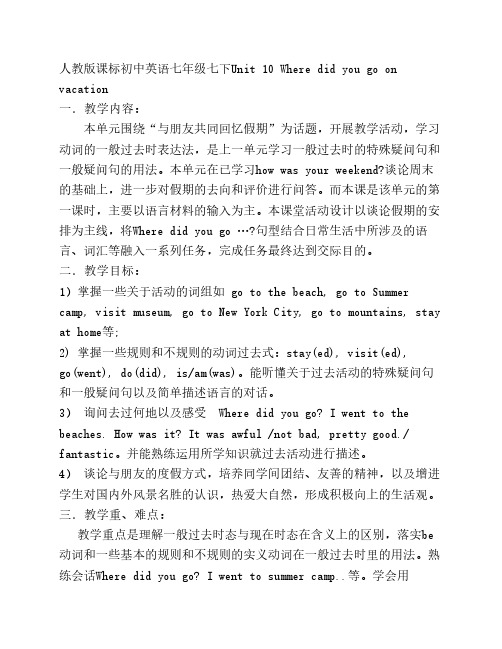
人教版课标初中英语七年级七下Unit 10 Where did you go onvacation 一.教学内容:本单元围绕“与朋友共同回忆假期”为话题,开展教学活动,学习动词的一般过去时表达法,是上一单元学习一般过去时的特殊疑问句和一般疑问句的用法。
本单元在已学习how was your weekend?谈论周末的基础上,进一步对假期的去向和评价进行问答。
而本课是该单元的第一课时,主要以语言材料的输入为主。
本课堂活动设计以谈论假期的安排为主线,将Where did you go …?句型结合日常生活中所涉及的语言、词汇等融入一系列任务,完成任务最终达到交际目的。
二.教学目标:1)掌握一些关于活动的词组如 go to the beach, go to Summercamp, visit museum, go to New York City, go to mountains, stayat home等;2) 掌握一些规则和不规则的动词过去式:stay(ed), visit(ed),go(went), do(did), is/am(was)。
能听懂关于过去活动的特殊疑问句和一般疑问句以及简单描述语言的对话。
3) 询问去过何地以及感受 Where did you go? I went to thebeaches. How was it? It was awful /not bad, pretty good./fantastic。
并能熟练运用所学知识就过去活动进行描述。
4) 谈论与朋友的度假方式,培养同学间团结、友善的精神,以及增进学生对国内外风景名胜的认识,热爱大自然,形成积极向上的生活观。
三.教学重、难点:教学重点是理解一般过去时态与现在时态在含义上的区别,落实be动词和一些基本的规则和不规则的实义动词在一般过去时里的用法。
熟练会话Where did you go? I went to summer camp..等。
七年级英语下学期Unit10Where did you go on vacation 单元整体课件 人教新目标版

He drew a picture.
What did he/she/they do last weekend?
He played the guitar.
He played the drums.
He cleaned his room. He played the trumpet.
They had a party.
(夏令营)
Where did you go on vacation? I visited the USA.
I went to New York City.
Where did you/he/she/they go on vacation?
Gulang Island, Xiamen
Ti’anmen, Beijing
Tom
Listen :
Where did Nancy , Kevin , and Julie go on vacation ? Match the person with the place .
Байду номын сангаас
People
1. Nancy c a 2. Kevin ____ 3. Julie ____ b
places
Sydney
Where did you/he/she/they go on vacation?
I stayed at home and watched TV.
I visited my friend/aunt.
1
2
3
Pairwork:Where did you/he/she/they go on vacation?
a. went to the beach
b. stayed at home
七年级英语下册Unit 10 Where did you go on vacation?教案
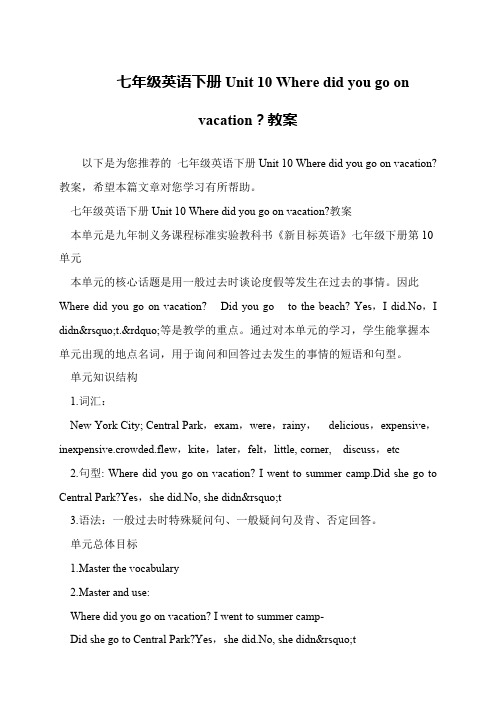
七年级英语下册Unit 10 Where did you go onvacation?教案以下是为您推荐的七年级英语下册Unit 10 Where did you go on vacation?教案,希望本篇文章对您学习有所帮助。
七年级英语下册Unit 10 Where did you go on vacation?教案 本单元是九年制义务课程标准实验教科书《新目标英语》七年级下册第10单元 本单元的核心话题是用一般过去时谈论度假等发生在过去的事情。
因此Where did you go on vacation? Did you go to the beach? Yes,I did.No,I didn’t.”等是教学的重点。
通过对本单元的学习,学生能掌握本单元出现的地点名词,用于询问和回答过去发生的事情的短语和句型。
单元知识结构 1.词汇: New York City; Central Park,exam,were,rainy,delicious,expensive,inexpensive.crowded.flew,kite,later,felt,little, corner, discuss,etc 2.句型: Where did you go on vacation? I went to summer camp.Did she go to Central Park?Yes,she did.No, she didn’t 3.语法:一般过去时特殊疑问句、一般疑问句及肯、否定回答。
单元总体目标 1.Master the vocabulary 2.Master and use: Where did you go on vacation? I went to summer camp- Did she go to Central Park?Yes,she did.No, she didn’t。
七年级英语-Unit10_Where_did_you_go_on_vacationAqnAwl
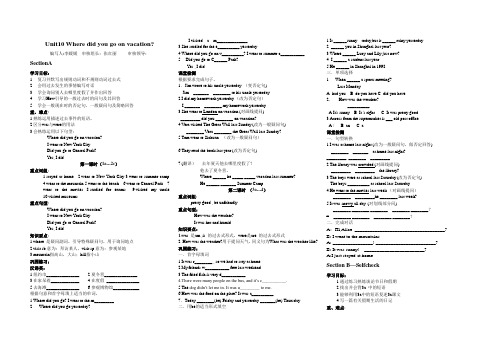
Unit10 Where did you go on vacation?编写人:李媛媛审核组长:张红丽审核领导:SectionA学习目标:1.复习并默写出规则动词和不规则动词过去式2.会用过去发生的事情编写对话3.学会询问别人去哪里度假了并作出回答4.学习How引导的一般过去时的问句及其回答5.学会一般现在时的否定句、一般疑问句及简略回答重、难点:1.熟练运用描述过去事件的短语。
2.区分was与were的用法3.会熟练运用以下句型:-----Where did you go on vacation?-----I went to New York City .-----Did you go to Central Park?-----Yes, I did.第一课时(1a---2c)重点词组:1.stayed at home2.went to New York City3.went to summer camp4.went to the mountain5.went to the beach6.went to Central Park7.went to the movies 8.studied for exams 9.visited my uncle10.visited museums重点句型:-----Where did you go on vacation?-----I went to New York City .-----Did you go to Central Park?-----Yes, I did.知识要点:1.where 是疑问副词,引导特殊疑问句,用于询问地点2.visit sb.意为:拜访某人,visit sp.意为:参观某地3.mountain指高山,大山;hill指小山巩固练习:汉译英:1.纽约市_______________2.夏令营_______________3.在家呆着_____________4.在度假_______________5.去海滩_______________6.参观博物馆____________根据句意和首字母填上适当的单词。
七年级英语下册-Unit-10-Where-did-you-go-on-vacation---一课件
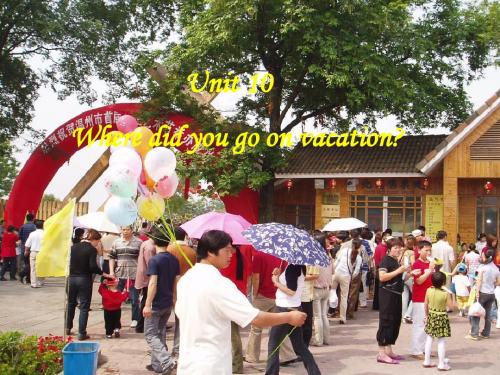
Make some conversations about your vacation.
A: Did you go to …on vacation ? / where did you go on vacation ?
B: … . A: How was your vacation / the park / the
Unit 10 Where did you go on vacation?
Where did I go on vacation ? You went to Yandang Mountains.
Yandang Mountains
Where did you go on vacation ? I went to \ visited \ … .
No, she /He didn’t.
the Palace Museum (V)
Beijing Hutong (V)
the Summer Palace (X)
1a
Match the activities with the pictures[a-g]
e 1.stayed at home __
2. Went to New York
1b 1.Tina 2. Brad 3. Sally 4. Xiang Hua 5. Tom
Do a survey
Ask your classmates about their vacation.
Ask: Where did you go on vacation?
What did you do there ? How was your vacation?
初中英语七年级下册课件Unit 10 Where did you go on vacation-

/ No, I didn’t.
Pair work
A: Did you … last weekend? B: Yes, I did./ No, I didn’t. A: Did your friend … last weekend? B: Yes, she/he did. / No, she/he didn’t.
stay at home / go to the beach...
Talk about my friend’s vacation
New York City summer camp
Central Park
museum
Talk about their vacations
1a
went to the beach
c a b
2b Listen again. For each question check( )“Yes,I
did.”or“No, I didn’t.”as you hear them talk√.
Where Did you…
Yes No
Nancy New York go to Central
City
1. Talk about what you did on your vacations. 2. Give some suggestions(建议) about vacations.
Unit 10
SectionA (1a-2c) Nanyan Middle School Zhou Wenfang
Talk about your vacation
ddiodmmyy hhoommeewwoorrkk
【初中英语七年级下】【unit 10】【Where did you go on vacation】3
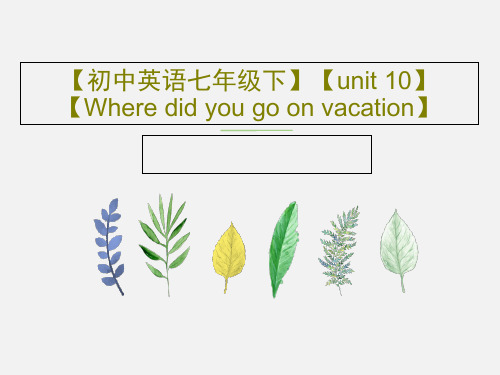
6、最大的骄傲于最大的自卑都表示心灵的最软弱无力。——斯宾诺莎 7、自知之明是最难得的知识。——西班牙 8、勇气通往天堂,怯懦通往地狱。——塞内加 9、有时候读书是一种巧妙地避开思考的方法。——赫尔普斯 10、阅读一切好书如同和过去最杰出的人谈话。——笛卡儿
Thank you
【初中英语七年级下】【unit 10】 【Where did you 。 57、春秋多佳日,登高赋新诗。 58、种豆南山下,草盛豆苗稀。晨兴 理荒秽 ,带月 荷锄归 。道狭 草木长 ,夕露 沾我衣 。衣沾 不足惜 ,但使 愿无违 。 59、相见无杂言,但道桑麻长。 60、迢迢新秋夕,亭亭月将圆。
- 1、下载文档前请自行甄别文档内容的完整性,平台不提供额外的编辑、内容补充、找答案等附加服务。
- 2、"仅部分预览"的文档,不可在线预览部分如存在完整性等问题,可反馈申请退款(可完整预览的文档不适用该条件!)。
- 3、如文档侵犯您的权益,请联系客服反馈,我们会尽快为您处理(人工客服工作时间:9:00-18:30)。
河北省秦皇岛市抚宁县驻操营学区初中七年级英语下册 Unit 10 Where did you go onvacation教学设计人教新目标版教材分析本单元的内容主要是“谈论过去发生的事(一般过去时)”。
Section A通过“谈论假期”这一话题,通过听力、对话练习、看图练习等方式帮助学生掌握如何谈论过去发生的事情(一般过去时)和谈论节假日的活动;Section B通过听力、对话、阅读日记等方式,帮助学生掌握更多描述假期的词汇,以及如何以日记的形式纪录一天的活动并表达感想;Self Check 部分帮助学生复习所学词汇,通过作调查表的方式帮助学生巩固所学。
这一单元的重点是运用一般过去时谈论过去发生的事。
重点词汇:were, stayed, visited, felt, summer camp, museum, expensive, awful, crowded, delicious, fantastic重点句型:Where did you go on vacation? Did you/he/she/they go to Central Park?Part 1: Teaching Design (第一部分:教学设计)Teaching goals● Learn some new place names● Learn some description words● Learn the past tense of some verbs studied● Go on learning to talk about past events.Vocabu laryNew Wordscamp, museum, guide, exam, rainy, fantastic, unfriendly, awful, delicious,expensive, crowded, cheap, water, cry, corner, feel, back, decide, make, classmate, discuss, report, activity,New phrasessummer camp, the Great Wall, the Palace Museum, Tian’an Men Square, go to the mountains, on vacation, bus trip, feel happyExpres sions Where did you go on vacation? I went to New York City.Where did he /she go on vacation? He / She went to the mountains. Did you /he /she go to Central Park?How was your vacation?How was the weather?Struct ures Where did you go on vacation? I went to Summer Camp.Where did they go on vacation? They went to New York City.Where did he / she go on vacation? She / He visited his / her uncle.Did you / she / he / they go to Central Park? Yes, I / he/ she/ they do.No, I / he/she/they don’t.Section ATeaching goals● Master the new words: awful, unfriendly, fantastic, rainy, exam, central, guide, museum, summer camp● Learn to ask and answer: Where did Tina go on vacation?She went to the mountains.Where did they go on vacation?They went to the New York City.Did you / he / she / they go to Central Park?Yes, I / he / she / they did.No, I / he / she / they didn’t.Teaching proceduresStep 1: Warming upActivity 11. Teacher lists some verbs on the blackboard.visit, go, stay, have, do, practice, am, are2. Ask students to change the words into the past forms together.visited, went, studied, had, did, practiced,Read the past forms loud.Activity 2Go on asking what you / he / she/ did last weekend using the verbs they learned. Focus their attention on the form of verbs.Step 2: Presenting1. Let students say out the verbs learnt before and teacher can help them say as many as possible.2. Ask students: Did you stay at home yesterday?Did you stay at school last weekend?Where did you go on vacation?Where did your parents go on vacation?3. Repeat the new language points.Step 3: PracticingActivity 11. Students work in pairs. Ask and answer about where their parents, friends and they themselves wentyesterday / last weekend / on vacation.Model: A: Where did you go yesterday?B: I stayed at home. Did you stay at home?A: Yes, I did. No, I didn’t. I went to the par k.B: Where did your parents go on vacation?A: They went to Beijing last month.2. Check some pairs.Activity 21. Point to the pictures in 1a. Let students talk about where the people went in pairs. Model: A: Where did the old man go in Picture f?B: He went to the beach.A: Where did the kid go on vacation?B: They went to a park.2. Check some pairs.Activity 31. Point out the numbered list of activities. Ask students to repeat.2. Then ask students to match each phrase with one of the pictures.3. Check the answers: 1.e 2.b 3. d4. c5. a6. f7.gStep 4: Listening (1b)1. Point to the picture. Ask students to tell what the person did in each scene.For example: She went to the mountains.He went to the beach.2. Play the recording the first time. Students only listen.TapescriptConversation 1Xiang Hua: Hey, Tina. Where did you go on vacation?Tina: I went to the mountains.Xiang Hua: Cool.Tina: Where did you go, Xiang Hua?Xiang Hua: I went to New York City.Conversation 2Girl: Where did you goon vacation, Sally?Sally: Nowhere. I stayed at home.Girl: And where did you go, Brad?Brad: I visited my uncle.Conversation 3Boy1: Where did you go on vacation, Tom?Tom: I went to summer camp. It was great.3. Play the recording the second time. Students listen and number the people 1—5 in the picture.4. Check the answers.1. went to the mountains2. visited my uncle3. stayed at home4. went to New York City5. went to summer camp5. Students work in pairs. Ask and answer about where Tina / Brad /Sally / Xiang Hua and Tom went on vacation.Step 5: Listening. (2a, 2b)1. Point to the 2 people’s names and read the names to the class. Point to the 2 vaca tion activities and ask a student to read the activities to the class.2. Play the recording the first time, students only listen and match the person with the place.TapescriptConversation 1Boy: Where did you go on vacation, Nancy?Nancy: I went to New York City.Boy: Oh, really? Did you go to Central Park?Nancy: Yes, I did. It was really nice.Conversation 2Girl: Where did you go on vacation, Kevin?Kevin: I went to the beach.Girl: Oh, that’s nice. Did you play volleyball?Kevin: No, I didn’t.Girl: Well, did you swim?Kevin: Yes, I did. The water was really warm.Conversation 3Boy: Where did you go on your vacation, Julie?Julie: I stayed at home.Boy: Oh, so, did you go to the movies or anything?Julie: No, I didn’t.Boy: Did you study for exams?Julie: Yes, I did.3. Check the answers. 1.c 2.a 3.b4. Play the recording the second time. Students listen and check “Yes, I did” or “ No, I didn’t”. as they hear them talk.5. Check the answers.Go to Central Park? Yes, I did.Play volleyball? No, I didn’t.Swim? Yes, I did.Go to the movies? No, I didn’t.Study for exams? Yes, I did.6. Students work in groups and talk about the activities in the chart and other activities.Model: Reporter: Nancy, where did you go on vacation?Nancy: I went to New York City.R: Really? Did you go to Central Park?N: Yes, I did.Ask Kevin and Julie in the same way.6. Check some pairs.Step 6: PracticingActivity 11. Ask students to say out different kinds of weather learnt before.rainy, snowy, sunny, windy, cloudy, hot, cold, warm, cool, humid2. Ask students: What’s the weather like today?How was the weather yesterday?How was the weather last Sunday?How was your last Sunday?Activity 2 (3a)1. Point to the example in 3a. Read it to the class.2. Ask students to work alone and fill in the blanks in the conversation, using “was” “were”3. Check the answers.1)was 2).was 3).were 4).were5).was 6).was 7).were 8).were4. Students practice the conversation in pairs and act out.Activity 31. Point to each of the pictures and ask students to say what they see. Then read the words under each picture. Pronounce any new word and explain the meanings of them if necessary.2. Students work in pairs and make their own conversations about the pictures.Model: A: How was your vacation?B: It was fantastic.A: Where did you go?B: I went to the mountains.A: How were the mountains?B: They were beautiful.A: How was the bus trip?B: It was relaxing.Activity 4Ask students to take out their photos of vacations and show their photos to the classmates and talk about their own vacations.Model: I went to Xi’an on vacation last year.It’s a very old city. The we ather was sunny. My parents and I visited the BellTower. The people there were friendly --Section BTeaching goals● Master the new words: water, cry, corner, feel, decide, make, classmate, discuss, report, activity● Learn to use new sentences:We had great fun playing in the water.The shops were too crowded.I didn’t really enjoy it.I found a small boy crying in the corner.That made me feel very happy.We decided to play tennis.Teaching proceduresStep 1: Making a revisionAsk students: What did you have for breakfast / lunch / supper yesterday?How was your breakfast / lunch/ supper yesterday?Where did you go on vacation?What did you do on vacation?Guide students to answer the questions in past tense and try to use the description words they learnt before.Step 2: PracticingActivity 11. Point to the words. Say each word and let students repeat it.2. Describe the picture as a model for students:This is a ring. It’s one hundred million dollars. It’s expensive.3. Ask students to describe the other 5 pictures in the same way.4. Ask students to match the words with the pictures.5. Check the answers: 1.f 2.a 3.d 4.e 5.b6.cActivity 21. Point out the smiley face and frowny face. Say the smiley face is for good things. The frowny face is for bad things.2. Call attention to the six words in 1a. ask students to write each word under smiley face or frowny face individually.3. Check the answers: Smiley face: delicious, cheap, not crowded.Frowny face: awful, expensive, crowded4. Students ask and answer about the 6 pictures in pairs.Model: A: How is the ring?B: It’s expensive.Step 3: Listening (2a, 2b)1. Point to the 2 questions in 2a. ask a student to read them to the class. Draw students’ attention to listen to Vera talking about her vacation carefully.2. Play the recording the first time. Students listen and write down the answers to the questions in the blanks in 2a.Tape scriptGirl 1: Hi, Vera. How was your vacation?Vera: It was great!Girl 1: Where did you go?Vera: I went to Tokyo with my family.Girl 1: Really? Wow! What did you do there?Vera: Well, we went to a lot of museums.Girl 1: Oh, how were they?Vera: They were really interesting. But they were also very crowded.Girl 1: Did you go shopping?Vera: Yeah, I did.Girl 1: How were the stores?Vera: Oh, they were very expensive.Girl 1: And how were the people? Did you meet any Japanese people?Vera: Yeah, the people were really friendly. My parents have some Japanese friends, and we had dinner at their house.Girl 1: How was the food?Vera: It was delicious. I love Japanese food.3. Check the answers.She went to Tokyo.Yes, she did.4. Call students’ attention to the chart in 2b. Play the recording the second time. Students listen carefully and fill in the chart.5. Check the answers.vacation: great museum: interesting, crowdedstores: expensive people: friendlyfood: delicious6. Students listen again and repeat.7. Students work in pairs. Sa is Vera’s friend. Sb is Vera. Talk about Vera’s vacation, using the information in the chart in 2b. Sa begins his questions with these words.Where did...?What did ...?Did you ...?How was ...?How were ...?Step 4: Reading (3a)1. Call students’ attention to Bob’s diary and give students some questions. Let students read the diary alone and find out the answers to the questions given.Question 1: How was the weather on July 15th / July 16th / July 17th ?Question 2: Where did he go on July 15th / July 16th / July 17th ?Question 3: What did he do on the 3 days?Question 4: How were his 3 days on the vacation?2. Check the answers.3. Explain the instructions in 3a. Then ask students to read the article alone again to circle the good things about his vacation and underline the bad things.4. Check the answers.Good things.the weather (great)the beach (beautiful)playing in the water (fun)helping the little boy find his father (happy)playing tennis (really fun)eating Sichuan food (delicious)Bad things:shops were too crowded (didn’t really enjoy them)museum (kind of boring)no money for taxi / walking back to hotel (tired)5. Call students’ attention to the new phrases in the diary.have fun doing sth, be crowded, find sb doing sth, be lost, help sb do sth. Make sb do sth, walk back to, decide to do sthExplain the phrases and give more examples to use them. Then let students make up their own sentences with the phrases above.Step 5: Writing (3b)1. Students work in pairs and talk about the places of interest in 3b.2. Students take out a piece of paper and work alone to write a travel diary, imagining they are foreigners on vacation in Beijing. They can go like this:Thursday, August 1stToday I went to the PlaceMuseum. It was cool. Then I ....3. Ask some individual students to read their diary to class.Self-checkTeaching goals● Help students to review all the key vocabulary presented in this unit.● Help students practice writing a survey using the past tense.● Give students an opportunity to use the target language in conversation.Teaching ProceduresStep 1: Learning words1. Ask students to read the key words in Part 1 aloud and know the meaning of them.2. Ask students to divide the words in 3 groups.1) verbs: stayed at home, visited2) nouns: vacation, summer camp, mountain, museum,3) adjectives: delicious, awful, cheap, crowded,3. Ask students to write five or more new words in their vocab-builder.4. After students finished asking questions. Tell them to discuss in their groups about the best place for a vacation.5. Ask several groups to tell the class which place they think is the best vacation destination.。
